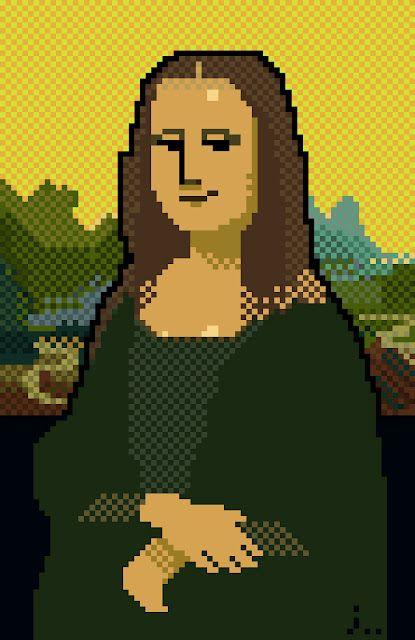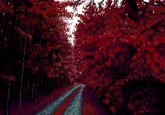Pixel Art
Part of a series on Fan Art. [View Related Entries]
[View Related Sub-entries]

About
Pixel Art is a style of digital art made of raster graphic software, in which the data exists on a rectangular grid of square-shaped pixels. It is often associated with 8-bit computer and video game art from the 1980s and early 1990s as well as chiptunes. Modern pixel art is not limited to an 8-bit 256 color palette.[1]
History
The concept of making art out of pixels dates back to 1972 when Richard Shoup released his graphics software program SuperPaint.[6] The program was the first to offer virtual paintbrushes and pencils as well as the option to change the hue and saturation values of an object. It was also one of the first graphics programs to offer a graphical user interface (shown below) in place of text-based environment. On October 14th, 1977, the Atari 2600 gaming console was released whose games used sprites, a type of two-dimensional image or animation that often took the form of a character moving across a screen. The term "pixel art" was later coined in a paper[7] by Xerox Palo Alta Research Center employees Adele Goldberg and Robert Flegal published in the Association for Computer Machinery's newsletter in December of 1982.


As early as 1994, people were discussing pixel art on Usenet, with a thread on comp.os.mc-windows.misc[8] asking where to find bitmap files of stereoscopic pixel artworks. In May 1997, artists Kai Vermehr, Steffen Sauerteig and Svend Smital established eBoy[2], an art group dedicated to making extremely detailed and complex pixel art. They began doing landscapes known as "pixoramas" of both real and imagined cities including London (shown below, left) and the imagined SuperBroncoBattle (shown below, right).


On March 2nd, 2001, artist Brian Clevinger launched the Final Fantasy-inspired webcomic 8 Bit Theater.[3] This sprite comic ran through June 2010 with a total of 1,225 episodes.[4] In 2002, PixelMuseum[12] launched, showing pixel art, photography and digital art in a virtual pixel museum (shown below). Also in the early 2000s, pixel artists began establishing themselves with personal websites including PixelFreak[9], Army of Trolls[10] and PixelDeviant.[11] During this same time period, a number of pixel art tutorials were created across the web on personal websites[13] and free hosts like Tripod.[14]

In August 2008, the /r/PixelArt[15] subreddit was created, gaining more than 9,600 readers as of August 2013. The same year, a professor at Rensselaer Polytechnic Institute (RPI) began teaching Pixel Art[16] as part of her Media Studio Imaging class. In 2010, the browser-based pixel art creator Piq[17] launched, allowing a space for users to share and comment on each other's works as well. On May 21st, 2010, Simon Cottee[18] uploaded an 11-minute documentary about the history of pixel art to YouTube (shown below) which has accrued more than 261,000 views as of August 2013.
Demakes
Demakes are works which recreate scenes from a game with modern graphics in pixel art. This has been practiced since as early as May 2008 on the PixelJoint forums, with a Game Boy style version of American McGee's Alice.[18] Since then, demakes have appeared on deviantART[19], the Pixelation forum[20], PixelDrip[21] and GameRanx.[22] Demakes are also popular on YouTube, where there are more than 84,000 search results for "demake" as of August 2013.[23]
Notable Images





Related Memes
Sticky Note Art
Sticky Note Art is a collage-making technique that involves using sticky notes to create large-scale murals that appear to be pixel artworks from a distance. Sticky note art became popular through pranks in college buildings and offices, one of the earliest instances dating back to 2003 in an April Fools Day prank staged at the M.I.T List Center Media Test Wall.



Habbo Hotel
Habbo Hotel is an online community founded in 2000 that consisted of a number of localized virtual communities built as pixel art hotels. Users could create an avatar and interact with each other throughout the different areas of their hotel. In 2005, it was the site of the 4chan raid known as Pool's Closed (shown below), in which users donned an avatar of a black man with an afro and a suit and lined up in front of hotel pools, declaring it closed. As of August 2012, Habbo was available in 11 languages and saw approximately 5 million unique visitors per month.
Catbread / Nekopan
Catbread is a character from a Japanese children’s book which is often used as an avatar in discussion forums online. The character became widespread on the English-speaking web in 2004 after a GIF animation of the character was featured in a YTMND page created by the site’s founder Max Goldberg, who paired the animation with the song "Cuppycake Gumdrops."

Move Your Feet
"Move Your Feet" is a 2003 single by the Danish musical duo Junior Senior that was released with a pixel art music video drawn by the art collective Shynola. The video spread throughout humor sites like eBaum's World, College Humor and YTMND in the early 2000s before it was uploaded to YouTube in 2008.
Breadfish
Breadfish is a looped animation featuring several tiled loaves of bread with green fish protruding through the middle, accompanied by the song “Have You Seen the Marvelous Breadfish?” The animation was uploaded to Weebl's Stuff on September 20th, 2004, but its creator remains unknown.
MInecraft Pixel Art
Minecraft Pixel Art consists of works made out of multicolored blocks found in Minecraft. After the indie sandbox game was released in May 2009, the earliest known pixel art was shared in the community forums on June 16th of that year, featuring a sepia-toned Mario.



Minimalist Pixel Art
Minimalist Pixel Art is a form of geometric minimalism that abstracts iconic characters or objects from video games, television shows and movies to a vertical color scheme. The style was developed by the artists of InfiniteContinues in August 2010 when they shared an abstract version of Street Fighter's main characters (shown below, left).



Nyan Cat / Pop Tart Cat
Nyan Cat is an animation of a gray cat with the body of a cherry pop tart flying through outer space. The animation was created by Chris Torres for his daily comics site LOL-COMICS on April 2nd, 2011, inspired by two separate requests for a cat and a pop tart during a Red Cross charity drawing event on Livestream. Three days later, YouTuber saraj00n paired the animation with the Japanese vocaloid song Nyanyanyanyanyanyanya by Daniwell-P. Within two weeks, the video was viewed more than one million times and has since accrued more than 100.9 million views as of August 2013.
Search Interest
External References
[3] Nuklear Power – 8 Bit Theater
[4] Wikipedia – 8-Bit Theater
[5] Pixel Joint – Pixel Joint forum avatars buddy icons and sprites
[6] Wikipedia – SuperPaint
[7] DeepDyve – ACM President's Letter: Pixel Art
[8] Google Groups Archive – comp.os.mc-windows.misc: 3D PIXEL ART as BMP
[11] PixelDeviant (via Wayback Machine) – Home
[13] Petesqbsite – So You Want To Be A Pixel Artist?
[14] Tripod – Pixel Art with Pixia
[15] Reddit – /r/PixelArt
[16] RPI – Katheen Ruiz' Pixel Art Lecture
[18] PixelJoint – American McGee's Alice Game Boy demake
[19] deviantART – Monster Hunter Gameboy demake
[20] Pixelation – Demake dump
[21] PixelDrip – Junkboy’s Next Gen Demakes
[22] GameRanx – Markus Toivonen's Pixelart Demakes of Popular Games
[23] YouTube – Search Results for "demake"


![No Mana - Other Side [OFFICIAL MUSIC VIDEO] No Mana - Other Side [OFFICIAL MUSIC VIDEO]](https://i.ytimg.com/vi/lNnpBKpqH4g/hqdefault.jpg)










![>>choose a deity to bless your run<< XILED LOCKED THE WANDERER PROTECTION FOR A PRICE + HP GOLD + DEF -ITEMY THE WISENED [I] FORBIDDEN KNOWLEDGE + EXP HP + ITEM - ATK THE END FIND SOLACE IN THE INEVITABLE + ATK +SPD - DEF - HP THE HARVEST A BOUNTY FOR THE PATIENT +GOLD +ITEM - EXP - DEF CHAOS YOUR FATE IS IN THEIR HANDS +??? PPP ܕܕܕ܀ -PPP EXILE LOCKED GO ALONE >](https://i.kym-cdn.com/photos/images/list/002/654/998/3f0)






Top Comment
Don Staff
Apr 02, 2012 at 12:58PM EDT